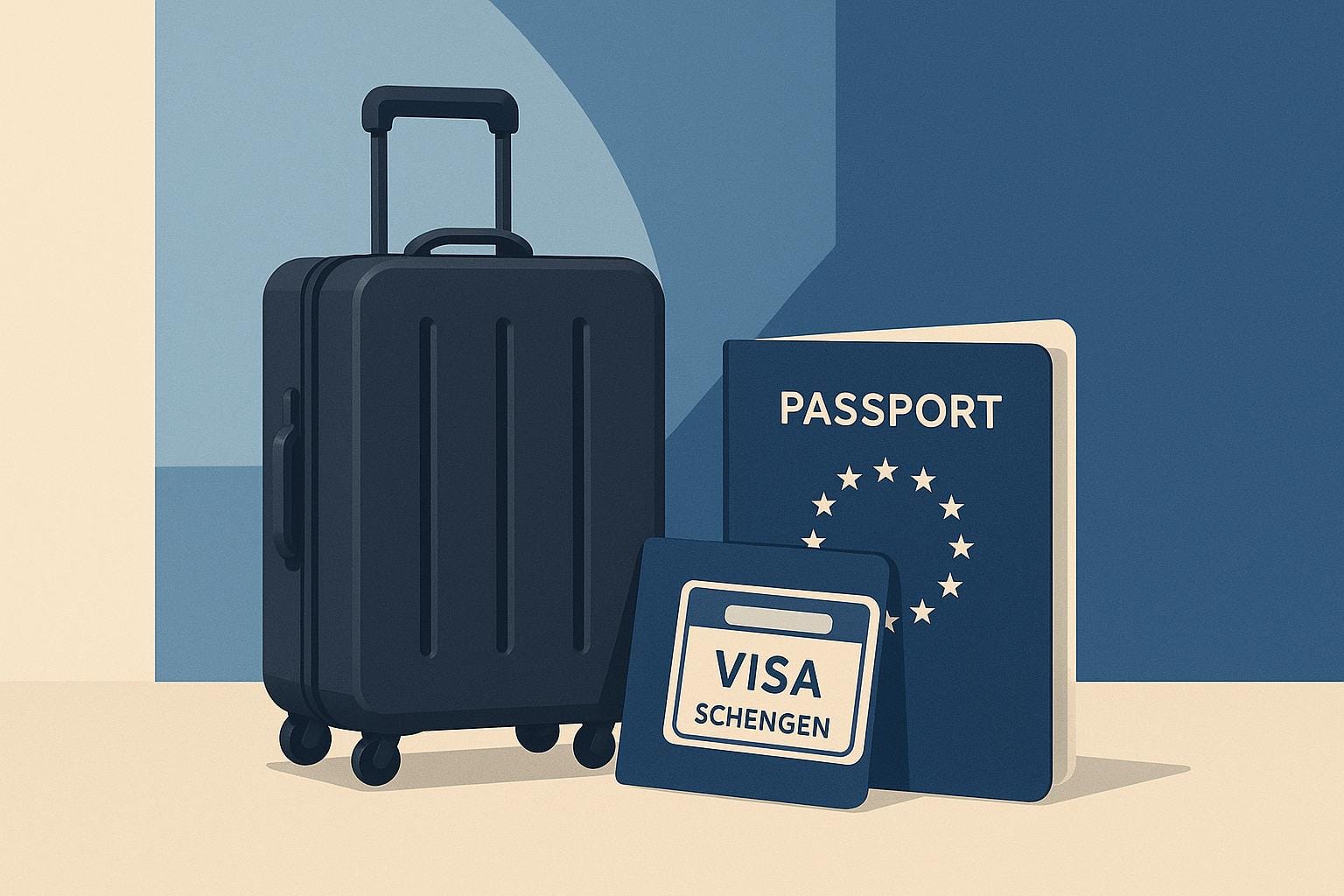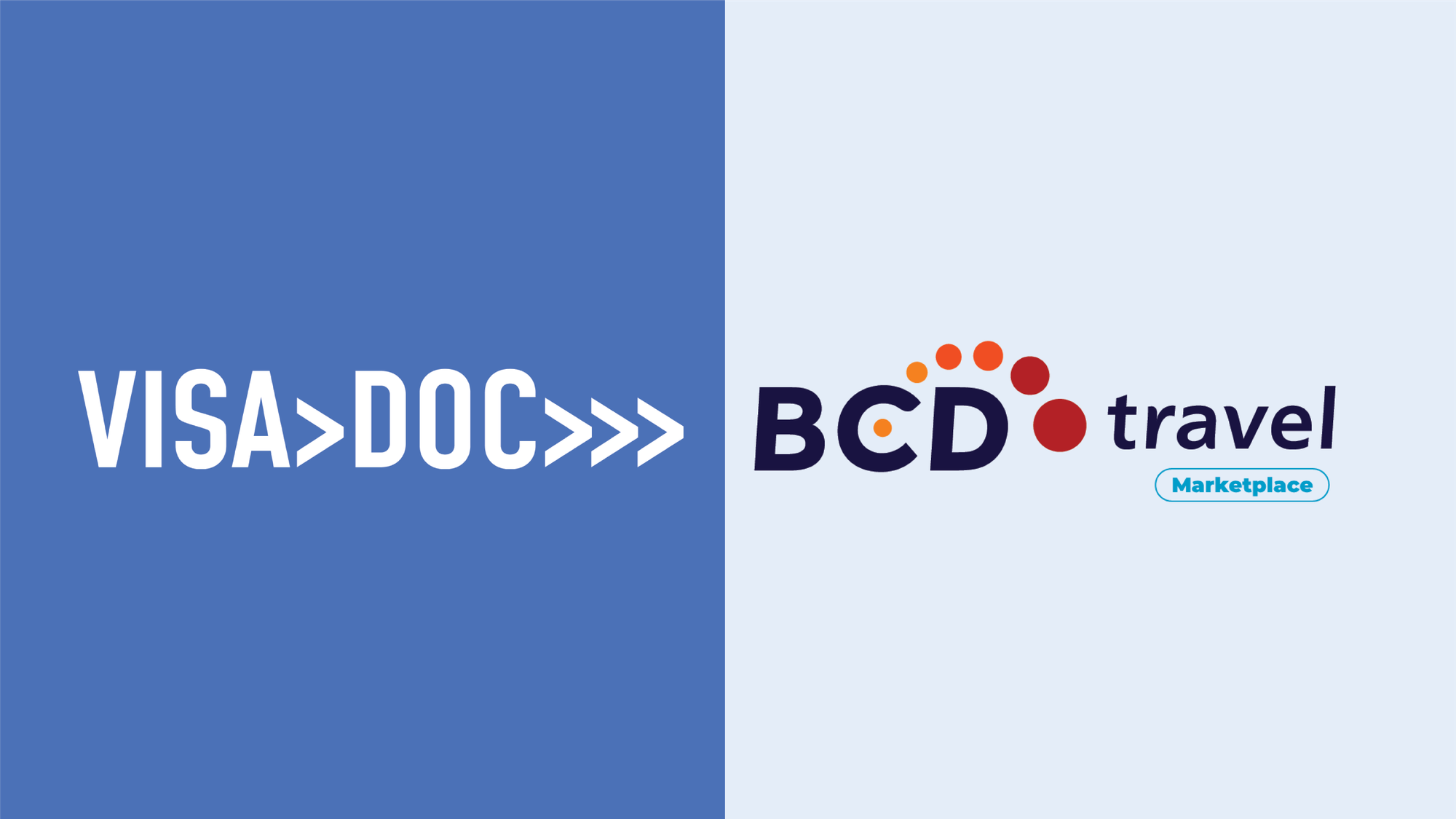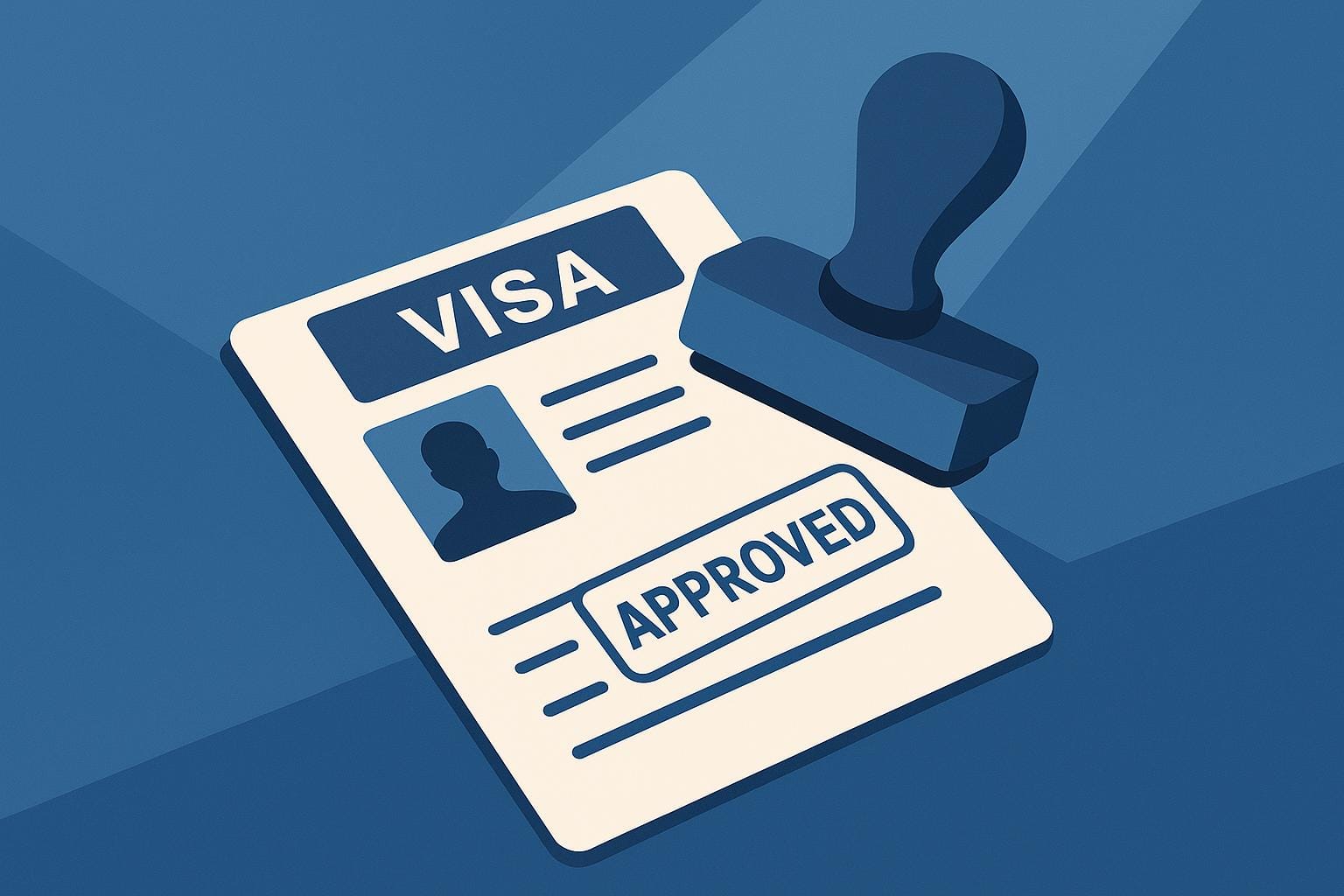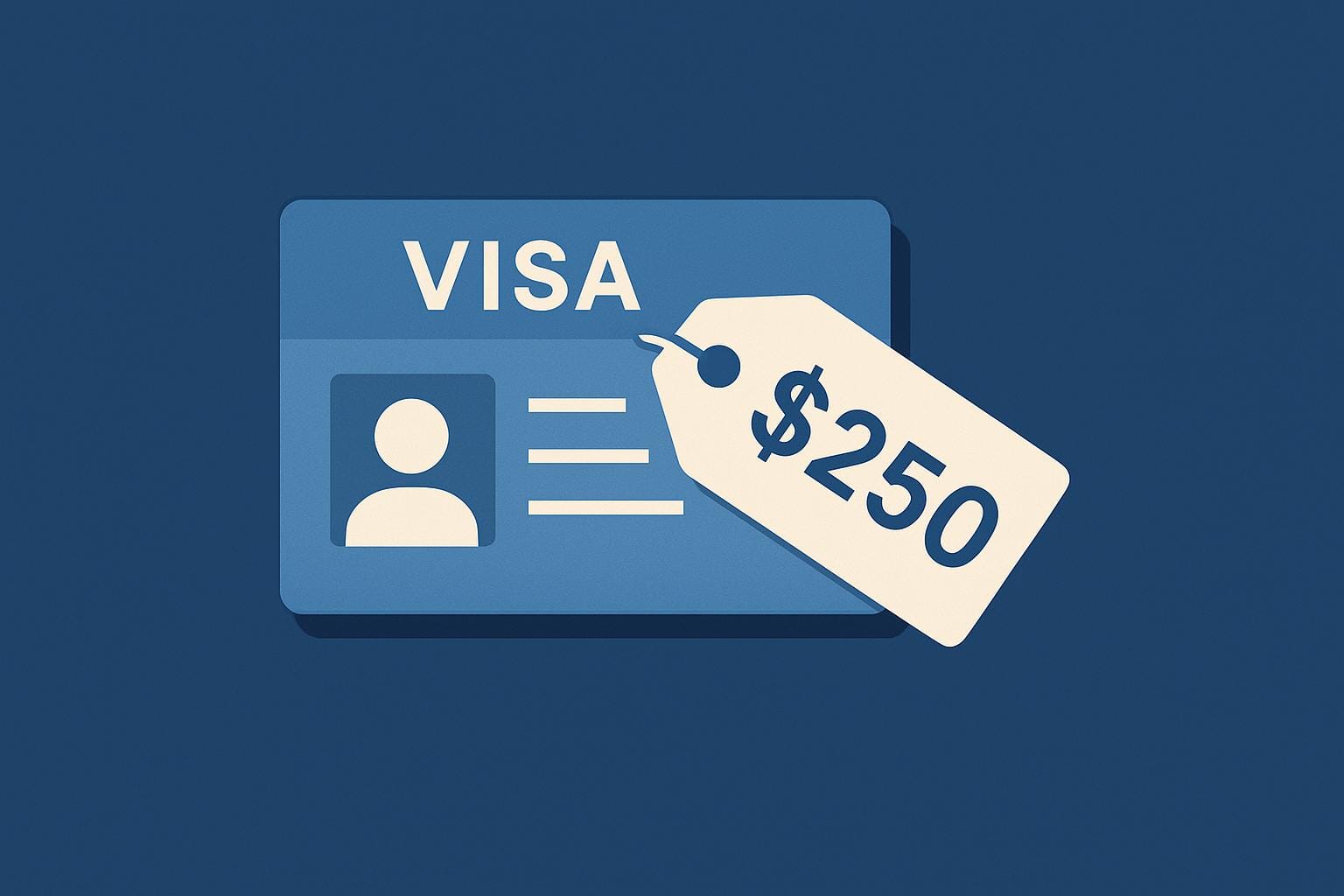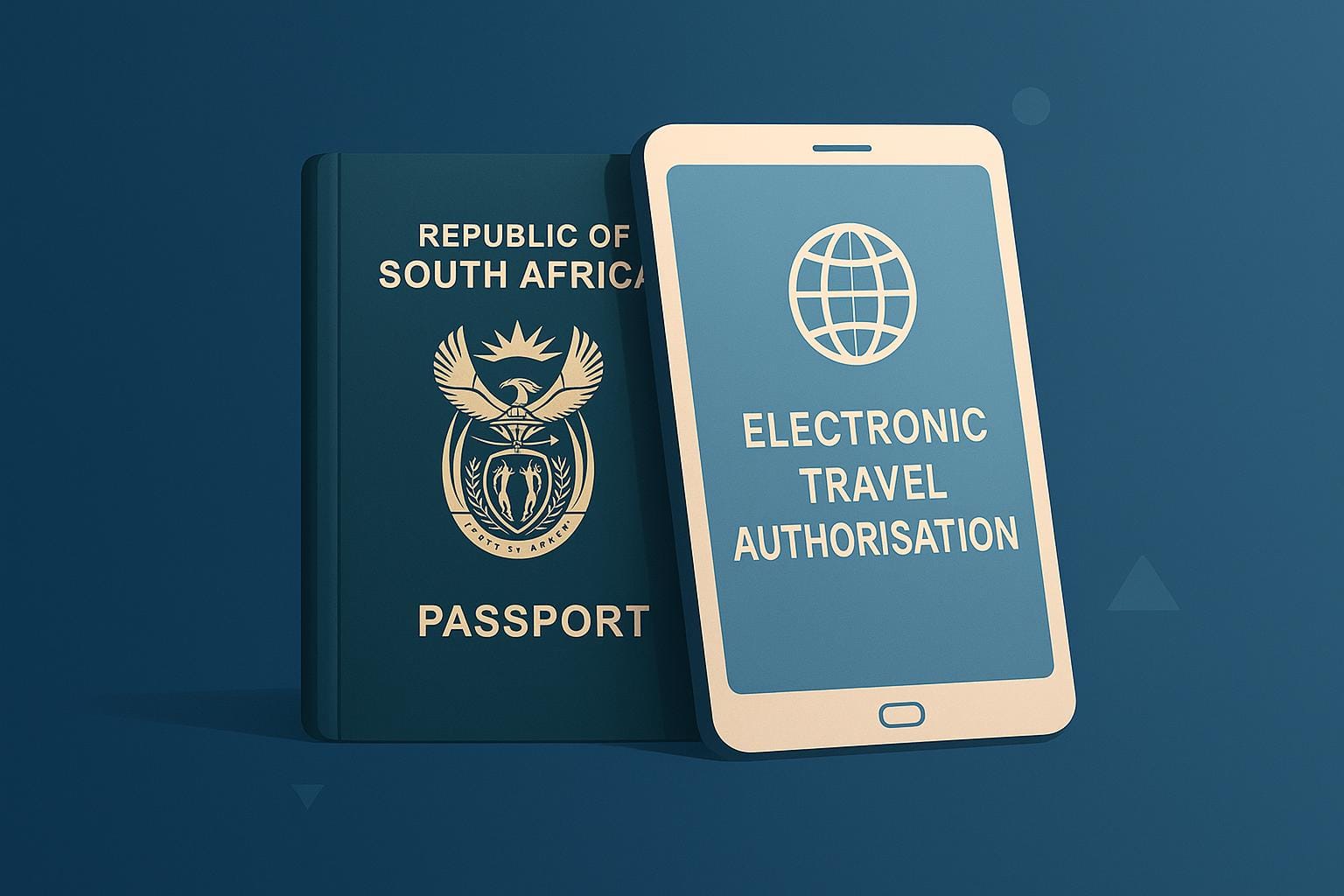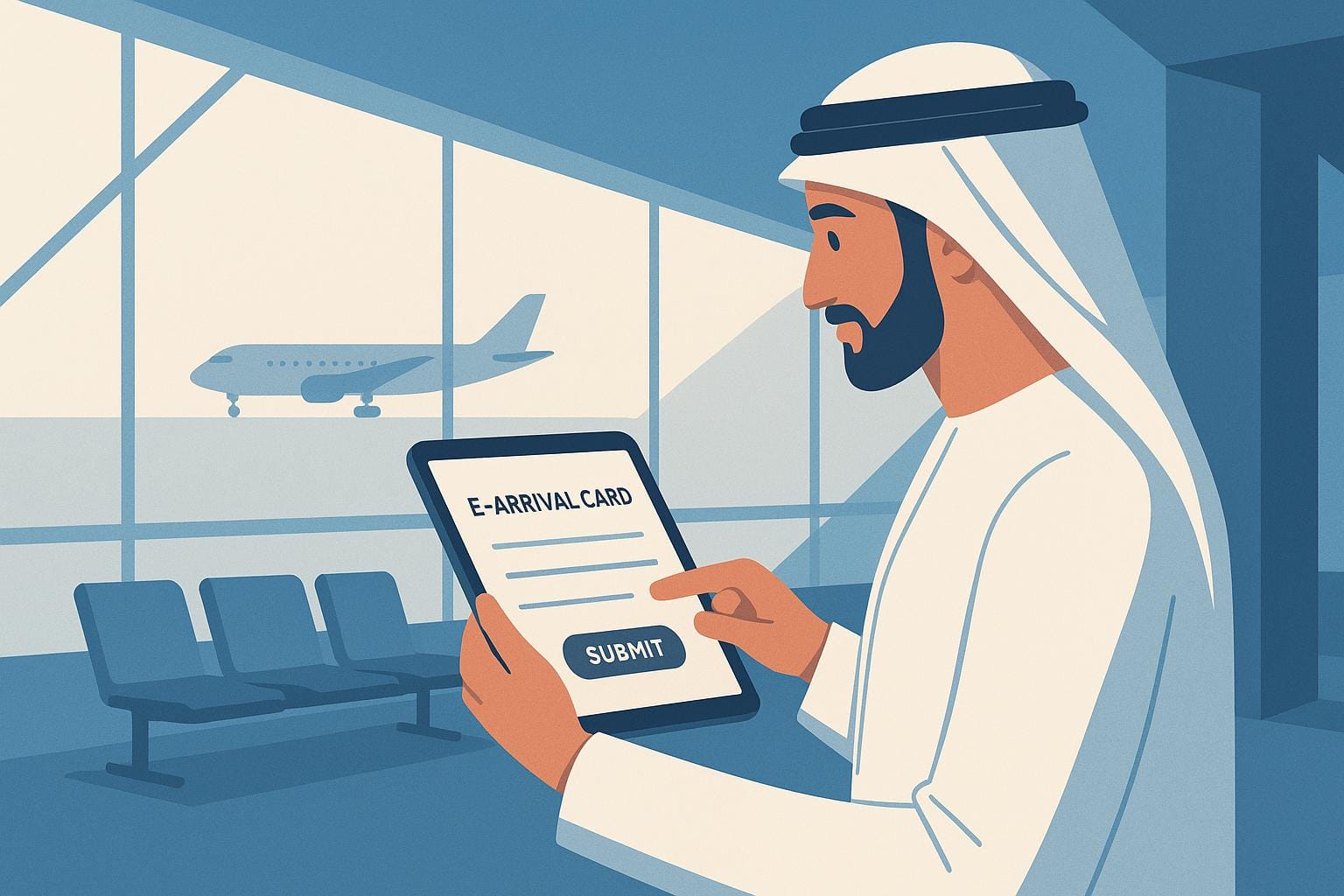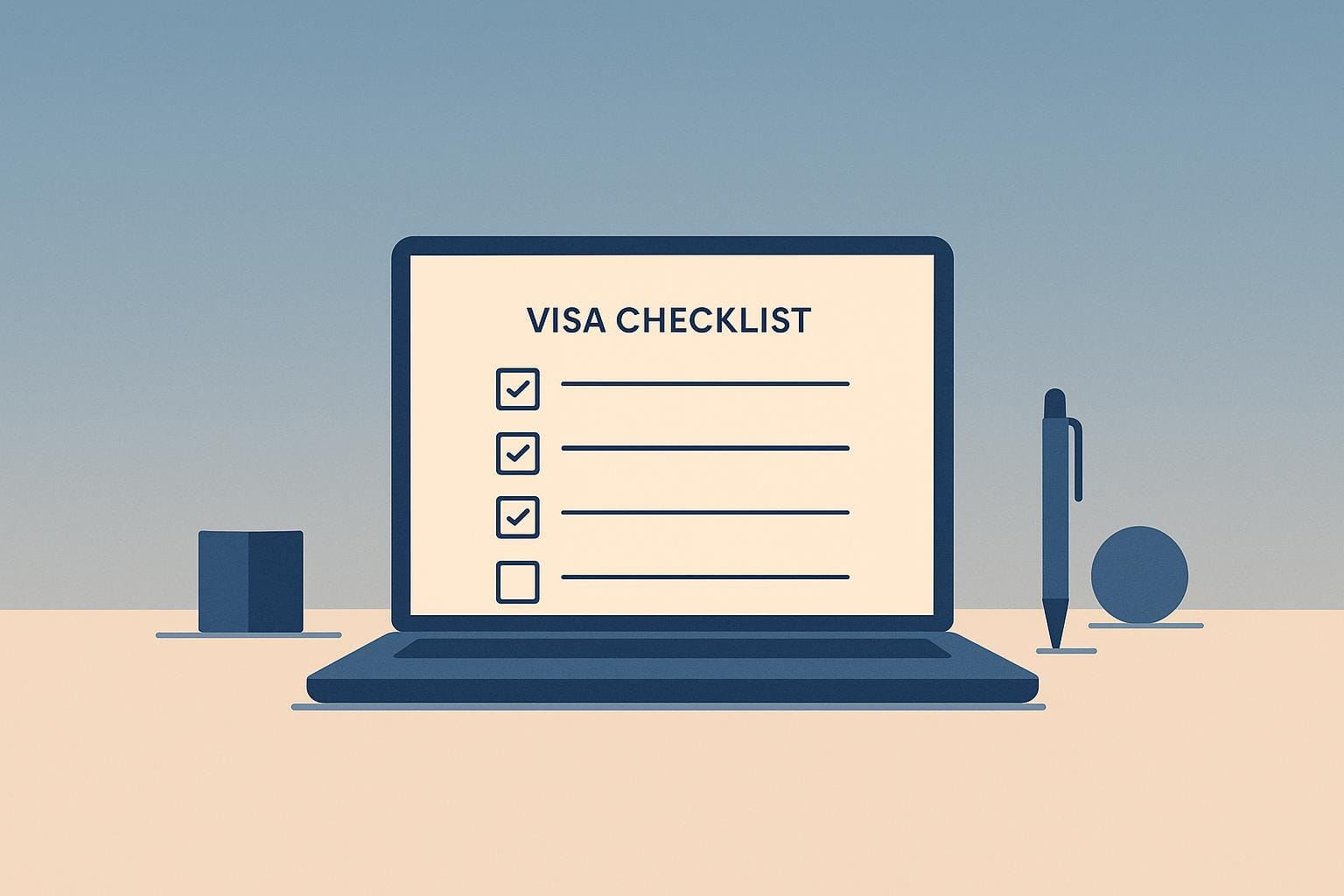Need to attend an urgent business meeting in the Schengen area but worried about visa delays? Here's the solution: a 72-hour expedited Schengen visa for business professionals. This fast-track option helps UK travellers bypass the usual 15–60 day processing times, ensuring you don't miss critical opportunities.
Key Points:
- Who qualifies? Business professionals with urgent travel needs, supported by valid documentation.
- Activities allowed: Business meetings, conferences, negotiations, training, and client audits.
- Required documents: Passport, employer and host letters, financial proof, travel arrangements, and insurance.
- Costs: Standard €90 visa fee, plus premium charges for expedited services.
- Processing time: Decisions in as little as 72 hours (availability varies by embassy).
Tools to Simplify the Process:
- VisaDoc platform: Automates document checks, prevents errors, and schedules embassy appointments.
- Smart tracking: Real-time updates on application status and reminders for deadlines.
Tip: Apply early (15–20 days before travel) and use embassies with faster processing, like Lithuania or Slovakia.
Fast-track your visa while staying compliant with UK GDPR and Schengen rules. Proper preparation and digital tools can make urgent corporate travel stress-free.
72-Hour Schengen Business Visa Requirements
The 72-hour Schengen visa processing service comes with strict eligibility and documentation criteria, ensuring only urgent and well-prepared applications are considered.
Who Can Apply for Fast-Track Processing
Fast-track processing is specifically designed for business professionals who need to travel urgently within the Schengen area. To qualify, applicants must provide evidence of the following:
- A valid business reason that necessitates immediate travel
- Strong ties to their home country
- Adequate financial resources
- Proof of return travel arrangements
Permitted business activities include:
- Business meetings (both internal and external)
- Conferences and seminars
- Negotiations
- Client audits
- Training sessions
Required Documents List
To support your fast-track visa application, you’ll need to prepare the following:
| Document Category | Requirements | Additional Notes |
|---|---|---|
| Personal Documentation | • Valid passport (minimum 3 months validity beyond your stay) • Two recent passport photos • Completed visa application form |
Passport must have been issued within the last 10 years and include at least two blank pages |
| Business Evidence | • Letter from employer • Invitation letter from host company • Business registration documents |
The invitation letter must be sent directly to the consulate |
| Financial Proof | • Bank statements for the last 6 months • Income tax returns • Employment contract |
Financial requirements vary depending on the country |
| Travel Arrangements | • Flight bookings • Hotel reservations • Travel insurance with a minimum coverage of €30,000 |
Insurance must cover all Schengen countries |
In addition to the above, applicants must include specific documents based on their employment status:
For employed professionals:
- Details of your job position and duration of employment
- Confirmation of travel expense coverage
- Information about the host company
For self-employed professionals:
- Company bank statements covering the last 6 months
- A current business licence
- Recent tax returns
Once all required documents are gathered and reviewed, the application process moves to digital verification and appointment scheduling. Careful preparation is key to ensuring a smooth and efficient application experience.
Digital Tools for Visa Processing
Meeting the demands of urgent business travel requires efficient solutions. VisaDoc's AI-powered platform simplifies the Schengen visa application process, giving HR teams the tools to handle expedited requests with ease.
Document Verification Tools
VisaDoc's automated document verification system addresses common application issues, reducing errors and ensuring compliance.
Smart Document Analysis
- Uses AI to validate passport details and supporting documents.
- Performs real-time compliance checks based on current Schengen visa requirements.
- Verifies formatting for photos and signatures automatically.
Error Prevention System
The platform actively prevents errors through automated checks, as shown below:
| Error Type | Automated Check | Benefit |
|---|---|---|
| Document Completeness | Ensures all required fields are completed | Reduces risk of rejection |
| Format Compliance | Confirms adherence to embassy standards | Speeds up processing |
| Data Consistency | Cross-checks information across documents | Avoids discrepancies |
| Expiry Validation | Verifies document validity periods | Maintains compliance |
Embassy Appointment Booking
VisaDoc also simplifies the often complex task of scheduling embassy appointments.
Priority Slot Management
- Provides real-time updates on available emergency appointment slots.
- Sends automated notifications when urgent slots open up.
- Integrates directly with embassy booking systems for seamless scheduling.
Launched in February 2025, this platform has reshaped urgent visa handling for multinational companies. By automating both document verification and appointment booking, HR teams can focus on exceptional cases while ensuring compliance with Schengen regulations.
Smart Tracking Features
- Offers real-time tracking of visa applications.
- Sends automated reminders for submission deadlines.
- Delivers instant alerts for embassy communications.
These features lay the groundwork for a smoother and more efficient visa application process.
How to Apply for a 72-Hour Schengen Visa
Here’s a step-by-step guide to applying for a Schengen visa using fast-track procedures.
Booking Priority Visa Appointments
To secure a priority appointment, you’ll need to provide verified documentation that demonstrates your urgent business need. Timing is everything here - expedited slots fill up quickly, so ensure your paperwork is complete before booking. Platforms like VisaDoc can help you find available priority slots at embassies known for quicker processing times.
Fast-Track Processing Options
| Embassy Type | Processing Time | Requirements |
|---|---|---|
| Standard Processing | 15 days | Regular business documentation |
| Expedited Processing | 3–10 days | Proof of urgent business + additional fee |
| Emergency Processing | 72 hours | Verified urgent need + premium fee |
For faster results, consider applying through smaller Schengen countries like Lithuania, Luxembourg, or Slovakia.
Biometrics and Document Submission
After securing your appointment, the next step is biometric registration and submitting your documents. VisaDoc’s system can help ensure your documents meet the specific requirements of your chosen embassy.
Make sure all previously listed documents are in order, with special attention to biometric registration details. For example, the Spanish embassy is prioritising applications for the UN Conference in Seville (30 June – 3 July 2025).
"However, just by applying under the 'urgent business' category will not give you a fast‐track visa procedure, it is only a way to make sure that appointments are given to business travelers on priority!"
It’s recommended to apply 15–20 days before your travel date.
Legal Requirements and Risk Management
Beyond making processes more efficient, ensuring legal compliance and managing risks is absolutely critical.
Data Protection Rules
When handling urgent Schengen visa applications, organisations must adhere to UK GDPR and the Data Protection Act 2018. This means taking steps to safeguard employee data while meeting legal obligations.
Here are some key requirements and how they should be implemented:
| Requirement | Implementation |
|---|---|
| Lawful Processing | Obtain explicit consent or confirm a valid legal basis for processing data |
| Data Minimisation | Collect only the information necessary for the visa application |
| Storage Limitation | Retain documents only for as long as legally required |
| Security Measures | Use encrypted methods for storing and transmitting data |
| Access Control | Limit access to sensitive data to authorised personnel only |
The Home Office generally retains visa application data for 15 years after the last action, or 25 years for settlement cases. It's essential to align your organisation's data retention policies with these standards while maintaining strong data protection practices. Combining this vigilance with automated workflow tools ensures that every step meets legal and compliance requirements.
Backup Plans for Visa Delays
Even with automation, there’s always a chance of delays. Having a solid backup plan can help mitigate risks and keep things on track.
Key Risk Mitigation Strategies:
- Book refundable travel arrangements to avoid financial loss.
- Begin the visa application process 3–6 months before your intended travel date.
Compliance Essentials:
- Maintain detailed records of embassy communications and processing timelines.
- Regularly check embassy updates for any changes in policies or procedures.
- Double-check applications for completeness before submission to avoid unnecessary delays.
A tracking system can also help identify compliance issues early, strengthening your contingency plans.
Emergency Response Protocol:
When delays occur, having a well-prepared response plan is vital. Options include switching to virtual meeting formats or delegating tasks if visa processing exceeds the 72-hour window. It’s also wise to engage embassy officials early to identify and address potential bottlenecks.
Finally, remember that misrepresenting business activities to speed up processing is strictly prohibited. All documentation must remain accurate and truthful, even when trying to expedite the process. By integrating these measures with digital oversight tools, you can achieve both fast visa processing and effective risk management.
Conclusion
Speeding up Schengen business visa applications hinges on leveraging digital tools and ensuring compliance with regulations. Last year alone, 17,000 business trips were disrupted due to incomplete or incorrect paperwork, underscoring the importance of a more streamlined and efficient process.
The 72-hour visa process offers a practical solution for urgent corporate travel needs. By incorporating features like automated document verification and embassy appointment scheduling, processing times can be significantly reduced while adhering to UK GDPR and international data protection standards.
Key elements that contribute to successful expedited visa processing include:
- Using 256-bit AES encryption to safeguard sensitive data during transmission
- Starting the application process as early as three months before the intended travel date
- Providing clear and thorough documentation to justify the urgency of the business trip
- Managing the complexities of 167,000 nationality-destination-application combinations effectively
HR departments can streamline operations with centralised tracking systems and automated updates, while biometric verification and multi-factor authentication ensure the security of travellers' personal data.
However, even with fast-track systems, comprehensive paperwork and a legitimate business purpose remain crucial for a successful application. Blending digital automation with strict compliance is the cornerstone of efficient 72-hour Schengen business visa processing.
FAQs
What do I need to prove an urgent business need for a 72-hour Schengen visa?
To apply for a 72-hour Schengen visa for urgent business travel, you'll need to present documents that demonstrate the necessity of your trip. These typically include:
- A formal invitation from a business partner or organisation in the Schengen area, clearly outlining the purpose and urgency of your visit.
- Evidence of urgency, such as a letter explaining why immediate travel is required (e.g., crucial meetings or negotiations).
- Relevant supporting documents, like contracts, meeting agendas, or business correspondence that directly connect your professional activities to the trip.
Make sure all your paperwork is accurate, up-to-date, and tailored to the specific requirements of the Schengen country you plan to visit. Providing thorough and well-organised evidence can make the application process smoother for urgent business travel.
What steps can I take to ensure my documents are complete and correctly formatted for an urgent Schengen visa application?
To keep your expedited Schengen visa application on track, it's essential to have all your documents in order and correctly formatted. Make sure you’ve gathered everything required, such as a valid passport, a completed application form, proof of financial means, and details of your accommodation. Double-check that all forms are signed, dated, and align with the most recent guidelines.
Keep your paperwork organised by grouping documents into categories and ensuring printed copies are in the proper format, like A4 size. If available, consider using priority processing services to speed things up, though bear in mind this might come with an extra cost. Paying close attention to these details can save time and help avoid unnecessary delays.
What should I do if my 72-hour visa application is delayed or refused, and how can I prepare for such situations?
If your 72-hour visa application hits a snag - whether it’s delayed or refused - the first thing to do is reach out to the embassy or consulate managing your case. Make sure you’ve given them enough time to process the application before following up. If they ask for additional documents, submit these as quickly as possible to keep things moving.
To avoid these headaches, try to submit your application well in advance. Double-check that all your paperwork is complete and accurate to minimise the chances of errors or rejection. It’s also smart to have a backup plan. Consider options like attending meetings virtually or looking into alternative travel arrangements in case your visa doesn’t come through on time.
Related Blog Posts
- China Business Visa 2025: Latest Requirements and Application Tips
- Business Visa Processing Times: Country-by-Country Guide
- Presenting at Tech Conferences in Germany: Short-Term Business Visa Requirements for Corporate Speakers
- UAE Business Meeting Visa Express: 14-Day Entry Options for Executive Delegations



